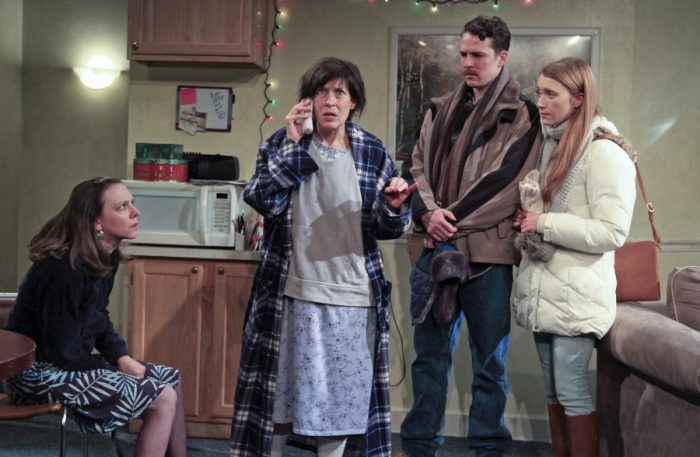
Lost Girls by John Pollono, directed by Joe Canuso. Theatre Exile, Philadelphia, March 2017
I’ve seen so many dramas about losers that I’m tired of the genre. I get impatient with people who keep repeating disastrous mistakes. But this play concerning three generations of struggling, unhappy women has something special.
There’s wit beneath the complaining, and hope beyond the recurring disappointments in their lives. The realistic dialogue is aided by Joe Canuso’s excellent direction and the fine acting by the five-person cast. The play comes to a climax with a surprising shift in time and an unexpected revelation about these people.
Maggie, a divorced woman in her thirties, must get to work even though her town in New Hampshire is in the midst of a blizzard, because she needs the money to pay her overdue electric bill. Her 16-year-old daughter Erica has stolen the family car and fled town. Maggie is desperate: “I got no car, I got no job. I got no job, I got no way ta pay bills.”
Maggie’s unemployed fiftyish mother is a dour figure who never wears anything but her sleepwear, and contributes nothing but vituperation and sarcasm to the situation.
The scene changes to a motel room, occupied by a world-weary 16-year-old (apparently the daughter) and a guy her own age. She has run away to meet her much-older boyfriend, traveling in a car driven by her classmate who’s been infatuated with her since elementary school.
Maggie’s ex, Lou, arrives with his second, younger wife, and he tries to call his state trooper friends to locate Erika. But power lines are down and iPhones are dead. Eventually he hears that the Honda has been in a pile-up on I-95.
Back to the motel; the girl and boy have had sex. In the afterglow he says “I’ll love you forever” and she says: “How about we make a promise to each other right now that no matter what happens, no matter where we end up, we’ll do it with each other again when we’re old?”
Erica returns home safely. She admits that she was with “a guy in my grade I’ve been spending time with.” Maggie and Lou have a tentative reconciliation, and the audience realizes the extent in which these three generations are tied. Playwright Pollono has intentionally misled us, in a deeply satisfying way.
Molly Ward was mesmerizing as the distraught Maggie. Catharine Slusar as her mother, Susanne Collins as her daughter and Sean Bradley as her ex, all were compelling. Amy Frear as the new wife and Trevor William Fayle as the teenager boyfriend made strong contributions.
Colin McIlvaine’s set creatively used Exile’s tiny stage, utilizing a turntable to provide smooth transitions between the house and the motel.
Please share your thoughts with us. Address to editor@theculturalcritic.com
Read other reviews on The Cultural Critic